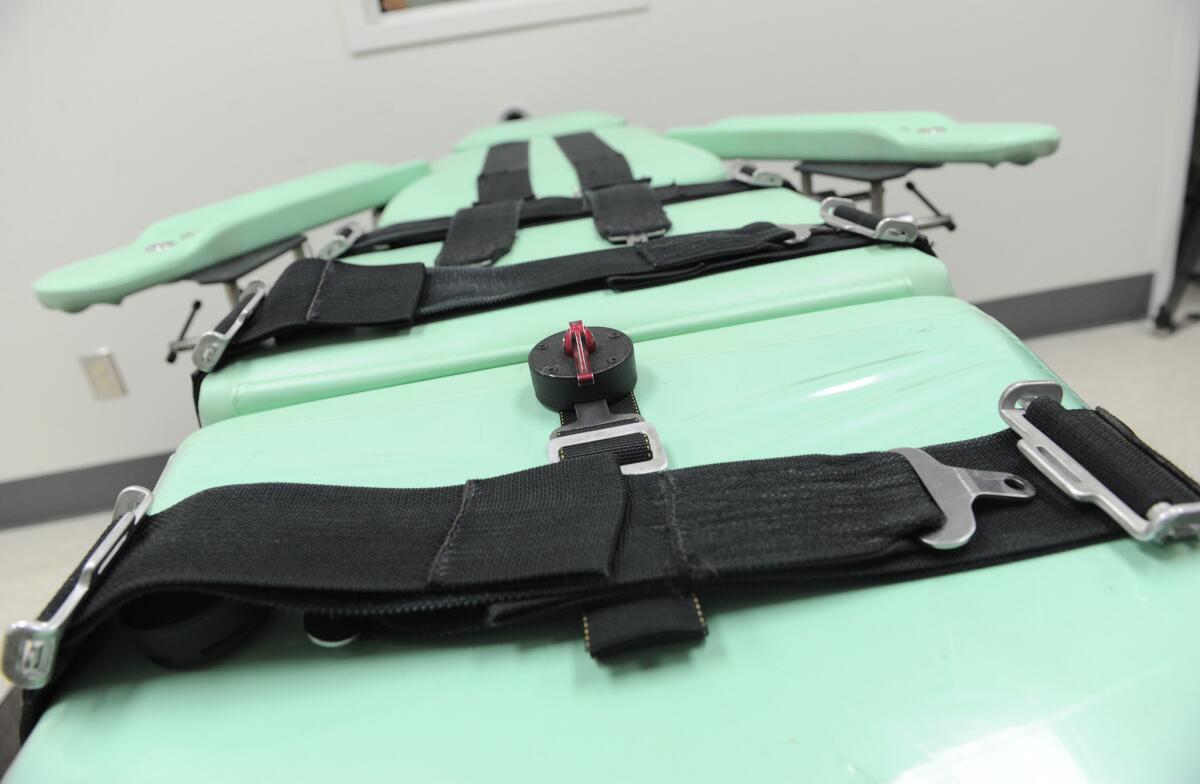Voters may weigh competing death penalty measures on 2016 ballot

- Share via
A pro-death penalty group unveiled a ballot measure Friday that would require death row inmates to work in prison and provide new deadlines intended to expedite appeals.
The measure, which would appear on the November 2016 ballot, is aimed at speeding up executions in California. The state has executed 13 inmates since 1978, but nearly 750 remain on death row, the largest in the nation. Most condemned inmates die of suicide or illness.
A proposed anti-death penalty initiative also has been submitted for state review, creating the possibility that voters next year will weigh competing initiatives on capital punishment. Both measures would require current death row inmates to work and pay restitution to victims, but one would keep the death penalty, and the other scrap it for life without parole.
Backers of the death penalty estimate their new measure would reduce the time from conviction to execution from as long as 30 years to 10 to 15 years.
San Bernardino County Dist. Atty. Mike Ramos, one of several supporters who spoke about the measure at a Los Angeles news conference, said it would honor the more than 1,000 victims — including 229 children and 43 peace officers — who have been murdered by inmates on California’s death row.
“The worst of the worst,” Ramos said.
Neither side in the death penalty debate has yet raised the commanding sums needed to assure ballot placement.
The pro-death penalty group said it has raised $1 million so far. The opposition has raised $350,000. An estimated $2 million is probably needed to gather the required signatures.
Friday’s news conference came a few days before the state plans to release a revised method of execution. The new protocol will involve a single drug rather than the three-drug cocktail previously used.
Court rulings have prevented the state from executing anyone since 2006. A federal judge ruled that the former method exposed inmates to inhumane suffering if one of the three drugs failed to work.
Santa Clara University law professor Gerald Uelmen, who headed a state commission several years ago on capital punishment, expressed pessimism Friday that the proposal by prosecutors and crime victims would work.
“It doesn’t address the causes of the delay,” he said.
The causes include the fact that there are too many crimes that now qualify for the death penalty, he said. “We end up with too many cases — more than the system can handle — coming in the door every year,” he said.
Another problem that has plagued the system has been lack of funding to provide death row inmates with qualified lawyers for appeals. The measure sets up deadlines for appointed lawyers to file their appeals and written arguments but provides no money to hire more attorneys, Uelmen said.
Lawyers who take appointments to represent indigent defendants in non-death penalty matters would be required under the measure also to accept death penalty appeals. Instead of taking capital appeals, those lawyers might walk away from indigent defense altogether, Uelmen said.
“The burden of these deadlines fall directly on appointed counsel, and you are just not going to get the lawyers to take these cases,” Uelmen said, “It also will spread the problem to all appointments for indigent counsel.”
The measure also is designed to prod the California Supreme Court, which by law decides all death penalty appeals, to dispatch decisions more quickly.
“Right now, two-thirds of all cases heard by the Supreme Court are death penalty,” said Matt Cherry, who works for a group backing the competing capital punishment measure. “Those cases delay other issues that go before the court.
“Without changing the Supreme Court system or allowing them to delegate cases to the lower courts, there is no way to speed it up.”
Ramos disagreed, saying the state’s highest court should prioritize capital cases.
“This is a whole different ballgame,” he said. “You’re talking about taking somebody’s life.”
The measure announced Friday is similar to one that death penalty supporters launched more than a year ago. The earlier proposal did not get enough signatures to qualify for the ballot.
A key difference is that the former was a proposed constitutional amendment, which requires more signatures than a mere change in state law.
Like the earlier measure, the newest one would allow the revised lethal injection method to take effect without exhaustive public comment. Death row inmates would be housed throughout the prison system.
The state’s voters narrowly defeated a ballot measure in 2012 that would have abolished the death penalty. Eight states have rescinded capital punishment laws since 2000.
Ana Zamora, the criminal justice policy director for the ACLU of Northern California, which sponsored the 2012 initiative to end the death penalty, said Friday’s proposal would just cause more delays.
“The only solution is to keep murderers in prison until they die,” she said.
But Kermit Alexander, whose mother, sister and two young nephews were killed in 1984, said families deserve the execution of those who killed their loved ones.
Choking back tears, the former football star said the killer, now on death row, had mistakenly gone to the wrong house when he killed Alexander’s family.
“If you prey upon the elderly or massacre our children,” Alexander said, “you should be required to pay the ultimate price. It’s the law. … Justice isn’t easy. Justice isn’t gentle. But justice denied isn’t justice.”
Dolan reported from San Francisco and Gerber from Los Angeles.
Twitter: @mauradolan and @marisagerber
ALSO:
Jerry Heller sues over his portrayal in ‘Straight Outta Compton’
Beverly Hills water wasters ‘should be ashamed,’ state regulator says
Burbank man, 20, ejected from car lands on 5 Freeway sign in Glendale
More to Read
Sign up for Essential California
The most important California stories and recommendations in your inbox every morning.
You may occasionally receive promotional content from the Los Angeles Times.















